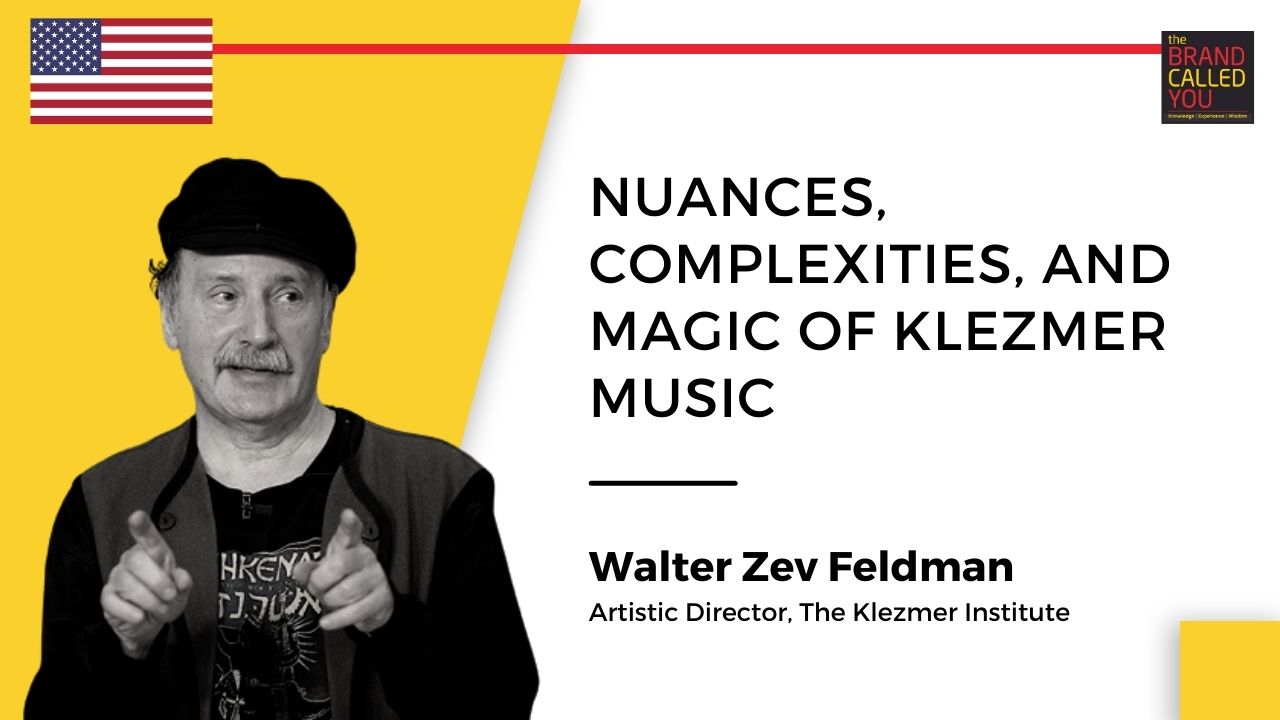Walter Zev Feldman, Artistic Director, The Klezmer Institute
- Walter Zev Feldman is credited with spearheading the revival of Klezmer music in the 1970s, bringing to life this relatively unknown form of traditional Jewish music.
- He is not only a Klezmer musician and dancer, but also an academic who has written many books and articles on a variety of subjects, including music, poetry, mysticism, and dance.
Podcast
Overview
Klezmer music is a form of Jewish folk music that originated in Eastern European Jewish communities in the 16th century. It is characterized by its lively, expressive melodies, the use of traditional instruments such as the violin, clarinet, and accordion, and its ability to evoke both joy and melancholy. In this episode, Walter Zev Feldman, the Artistic Director of The Klezmer Institute, talks about his life, background, and his work spearheading the revival of Klezmer music.
00:36- About Walter Zev Feldman
- Walter Zev Feldman is credited with spearheading the revival of Klezmer music in the 1970s, bringing to life this relatively unknown form of traditional Jewish music.
- He is not only a Klezmer musician and dancer, but also an academic who has written many books and articles on a variety of subjects, including music, poetry, mysticism, and dance.
- He is now exploring the role of gesture in the performing arts and its relationship to klezmer.
- His book, Music of the Ottoman Court: Makam, Composition, and the Early Ottoman Instrumental Repertoire (Berlin, 1996) are taught as a basic text worldwide.
03:02- How did your background inform your passion and love for Klezmer music?
- I grew up in an ethnic Jewish neighborhood in the West Bronx, where I was exposed to multiple languages including Yiddish, Romanian, Russian, Turkish, and French.
- My father was a good dancer from a town in Northern Moldova which was settled by Jewish immigrants under Turkish rule in the 18th century.
- My family interacted with Greeks, Turks, and Moldavians, and they were brought to regional organizations where my father would dance, and we would hear performances of famous klezmer musicians, including clarinetist Dave Tarras who studied in my father’s hometown.
- I learned later that my father’s hometown had a long history of musical interaction and high-level performance, which was an important basis for the American style of klezmer music.
17:35- The Topic of Gesture in Klezmer
- The topic of gesture has recently been explored and developed, particularly in relation to the brain’s response to repetitive rhythm.
- The cerebellum, which is connected to the movement, responds to this type of rhythm and can lead to dancing and shaking of the body.
- Some musical cultures base themselves on this motor rhythm, while others develop musical expressions closer to speech, which comes from another part of the brain.
- In Jewish culture, the dominant idea is that the dominant is never controlled by a moderator.
RESOURCES:
Klezmer Institute Home Page • Klezmer Institute
Watch CEU lecture from Vera Banki 1
CONNECT WITH US:
Enjoy this podcast?
Love to give us 5 stars? ⭐⭐⭐⭐⭐ If you do, we’d love a review from you. Help us reach more people to keep them in the know as we talk to leaders, high achievers, and thought leaders from diverse backgrounds and nationalities. Excellence can come
from anywhere; stay in the know, and hear from emergent high achievers and gurus.
Stay updated with what’s shaping the world today through the latest The Brand Called You Podcast episode. Follow us on iTunes, Spotify, and Anchor. fm.
You can find us at:
Website: www.tbcy.in
Instagram: http://bit.ly/3HO7N06
Facebook:http://bit.ly/3YzJOaD
Twitter: http://bit.ly/3wMBOXK
LinkedIn: https://www.linkedin.com/company/tbcy/
YouTube: http://bit.ly/3jmBqfq
Chingari: https://chingari.io/tbcypodcast
Josh: http://bit.ly/3WWP0nB
Thanks for listening!
Profile
- Walter Zev Feldman is credited with spearheading the revival of Klezmer music in the 1970s, bringing to life this relatively unknown form of traditional Jewish music.
- He is not only a Klezmer musician and dancer, but also an academic who has written many books and articles on a variety of subjects, including music, poetry, mysticism, and dance.
- He is now exploring the role of gesture in the performing arts and its relationship to klezmer.
- His book, Music of the Ottoman Court: Makam, Composition, and the Early Ottoman Instrumental Repertoire (Berlin, 1996) are taught as a basic text worldwide.


